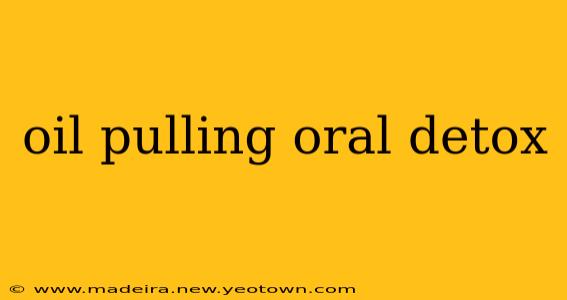For centuries, ancient cultures have whispered tales of a simple yet powerful oral cleansing ritual: oil pulling. This age-old practice, involving swishing oil in your mouth, has recently surged in popularity, touted as a natural way to improve oral hygiene and even detoxify the body. But is it all hype, or is there real science behind this ancient wisdom? Let's unravel the truth about oil pulling and explore its potential benefits and drawbacks.
Imagine this: you wake up, the first thing you do is swish a tablespoon of oil around in your mouth for 15-20 minutes. Sounds unusual, right? But for those who practice oil pulling, it's a daily ritual believed to have a myriad of benefits, from whiter teeth to improved overall health. But let's dive deeper than just surface-level claims.
What is Oil Pulling?
Oil pulling is a traditional Ayurvedic practice involving swishing a specific type of oil (usually coconut, sesame, or sunflower) in your mouth for several minutes. The belief is that the oil acts like a magnet, drawing out bacteria, toxins, and other harmful substances from the mouth and potentially even from the body. While the scientific evidence supporting these far-reaching claims is still limited, the practice does offer some demonstrable benefits related to oral health.
Does Oil Pulling Really Whiten Teeth?
Yes, anecdotal evidence and some studies suggest that oil pulling may contribute to whiter teeth. The process might help remove surface stains and plaque, leading to a brighter smile. However, it's crucial to remember that oil pulling is not a substitute for professional teeth whitening treatments. It can be a supplemental practice, but shouldn't replace regular brushing, flossing, and dental checkups.
Can Oil Pulling Help with Bad Breath?
Absolutely! This is one of the most well-documented benefits of oil pulling. The process helps remove bacteria that contribute to bad breath (halitosis). By eliminating these odor-causing microbes, oil pulling can leave your breath feeling fresher for longer. However, persistent bad breath might indicate an underlying medical condition, so always consult a dentist if the problem persists.
What are the Different Types of Oils Used for Oil Pulling?
The choice of oil depends largely on personal preference and availability. Coconut oil is a popular choice because of its pleasant taste and purported antimicrobial properties. Sesame oil and sunflower oil are also frequently used. Each oil may offer slightly different benefits, but the core principle remains the same. Always choose a high-quality, cold-pressed oil to avoid unwanted additives.
Is Oil Pulling Safe for Everyone?
While generally considered safe, oil pulling isn't suitable for everyone. Children, individuals with certain medical conditions, and those on specific medications should consult their doctor or dentist before starting this practice. Additionally, it's crucial to use food-grade oil and avoid swallowing the oil after pulling.
How Often Should You Oil Pull?
Most people oil pull once a day, typically in the morning before brushing their teeth. However, the frequency and duration can be adjusted according to personal preferences and comfort levels. Start with shorter sessions (5-10 minutes) and gradually increase the duration as you become more comfortable.
What are the Potential Side Effects of Oil Pulling?
While generally safe, some people experience minor side effects, such as nausea or a slight headache. These are usually temporary and subside once the body adjusts to the practice. Always listen to your body and stop if you experience any discomfort.
What are the Scientific Studies on Oil Pulling?
The scientific evidence supporting the broader health claims of oil pulling is still limited. More research is needed to fully understand its potential benefits and effects on overall health. However, the positive effects on oral hygiene are gaining increasing support through studies showing improved plaque reduction and gingival health.
In conclusion, oil pulling may offer several oral health benefits, including whiter teeth and fresher breath. While the claims regarding whole-body detoxification require further investigation, the practice is relatively safe when done correctly. However, it's crucial to remember that oil pulling should be considered a supplemental practice, not a replacement for regular dental care. Always consult your dentist before incorporating any new oral hygiene routine into your daily life.

